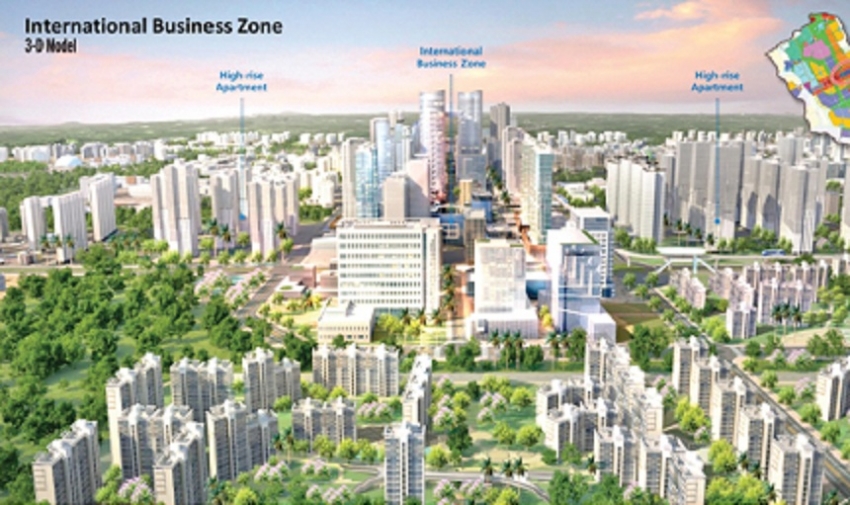The Tech City Development Project was initiated in early 2017 under the patronage of the Megapolis and Western Development Ministry to implement the Master Plan prepared for science, technology and innovation-based cities with boundaries from Kaduwela to Homagama via Malabe and Athurugiriya.
The project is a key of intervention with the vision of transforming our country into an innovation hub of Asia. The Tech City is designed to provide comprehensive all-encompassing eco-system for innovation. It also envisages creating opportunities for people through infrastructure development, enabling them to connect with each other and the rest of the world.
As a continuation of the Memorandum of Understanding (MOU) signed between the Megapolis and Western Development Ministry and the Land, Infrastructure and Transport Ministry of South Korea, technical assistance of South Korean experts were provided to complete the Master Plan of the Tech City Pilot Project site in late December, 2017.
The Mahenwatta, Homagama area has been selected as the main project site under this initiative and the newly-planned projects will commence under a phased-out plan. An optimum work and living environment will be created for all entrepreneurs, professionals and other stakeholders operating and working in this city.
The special structure plan of the Tech City will encompass four major clusters. The Research Development and Territory Education Cluster in Mahenwatta, Homagama, will develop a knowledge society through education as well as a national research innovation eco-system; the High Tech Cluster in Malabe, Kaduwela will facilitate hi-tech industrial components; the Leisure and Recreational Cluster in Diyagama will create high-standard convention centres, hotels and leisure activities to improve the standard of living; and the Electronic Cluster in Meegoda will develop world-class electronic and nano-tech products with research and development (R&D), business development centres and business incubations.
The Tech City Development Project has already commenced all infrastructure developments in early 2018 creating access to the airport via the outer circular highway, developing provincial roads, connecting new roads to the Southern Expressway and outer circular highway. It also possesses high-speed and high-capacity fibre optic coverage, recycling and waste treatment options, 24-hour potable water supply and reliable electricity network, access to national schools and world-class universities.
It also provides high-quality residential urban infrastructure facilities, and services are expected to be developed to create a conducive environment for scientists and creative individuals working and living in the area.
The Western Region Tech City Development Project’s investment is Rs. 266 billion. The date of completion of the project is December 31, 2030. The main objectives of the project are capacity building and specifying functions among innovation participants, creating approximately over 100 start-ups and attracting 20 multinational business ventures by 2030, creating approximately 150,000 employment opportunities by 2030, establishing an export-oriented industry-university-institute linkage system, constructing urban infrastructure with smart technology and improving the living environment to attract highly-skilled migrants.
The objective of the Ministry is to plan and develop the Western Province as a megacity with over eight million people as a business, communication and logistics hub. For this purpose, the government will take action to ensure the provision of infrastructure, water, sewerage, electricity, housing, and premises for economic, social and religious activities, educational institutions, health services, transport and other essential activities in the province.
In this context, the Ministry envisages transforming the entire Western Province into a megapolis to usher in comprehensive development. The scope of work under the purview of the Ministry primarily includes macro-level planning of the Western Megapolis region based on bio-geo-physical and socio-economic aspects.
The Western Region Megapolis Development will be the epicentre towards a long-standing, firmly-established and sustainable future urban process of Sri Lanka. Further, to design smart urban settlements in strategic locations of the country, it will also find solutions to resolve distinctive issues related to urbanisation such as garbage, slums, energy, traffic, environment and livelihoods.
****
The Megapolis and Western Development Ministry was established in terms of the provisions published in the Extra Ordinary Gazette No. 1933/13 dated September 21, 2015. According to the Gazette notification, the mandated functions of this Ministry are as follows:
* Formulation of policies, programmes and projects, monitoring and evaluation with regard to Megapolis and Western region development, and those subjects that come under the purview of departments, statutory institutions and public corporations of the Ministry.
* Kottawa, Kaduwela and Kadawatha Township Development Project and related activities.
* Integrated and systematic promotion and regulation of economic, social and physical development of urban areas.
* Urban solid waste management.
* Matters related to reclamation and development of low-lying areas.
* Provision of necessary guidance to develop urban areas, low-level of services and facilities and marshy land according to a common plan.
* Preparation of National Physical Plans and Regional Physical Plans.
* Direction and regulation of all construction work on the basis of National Physical Plans in integrated urban development.
* Matters relating to all other subjects assigned to the institutions coming under the purview of the Ministry.
* Supervision of the institutions coming under the purview of the Ministry.



















